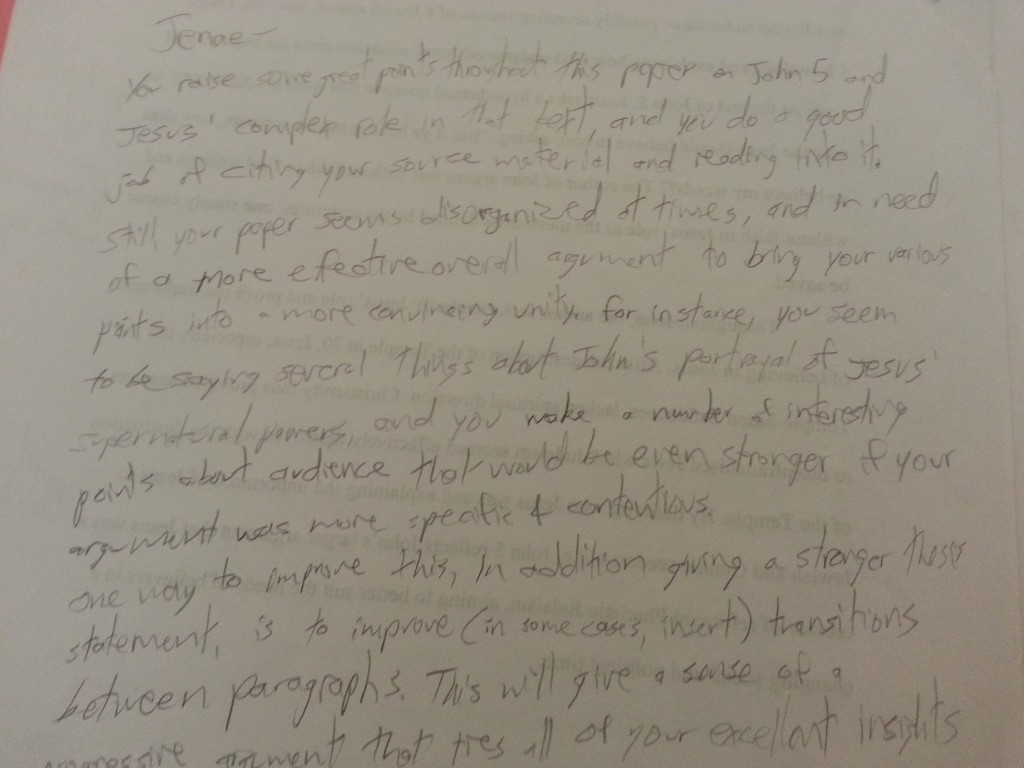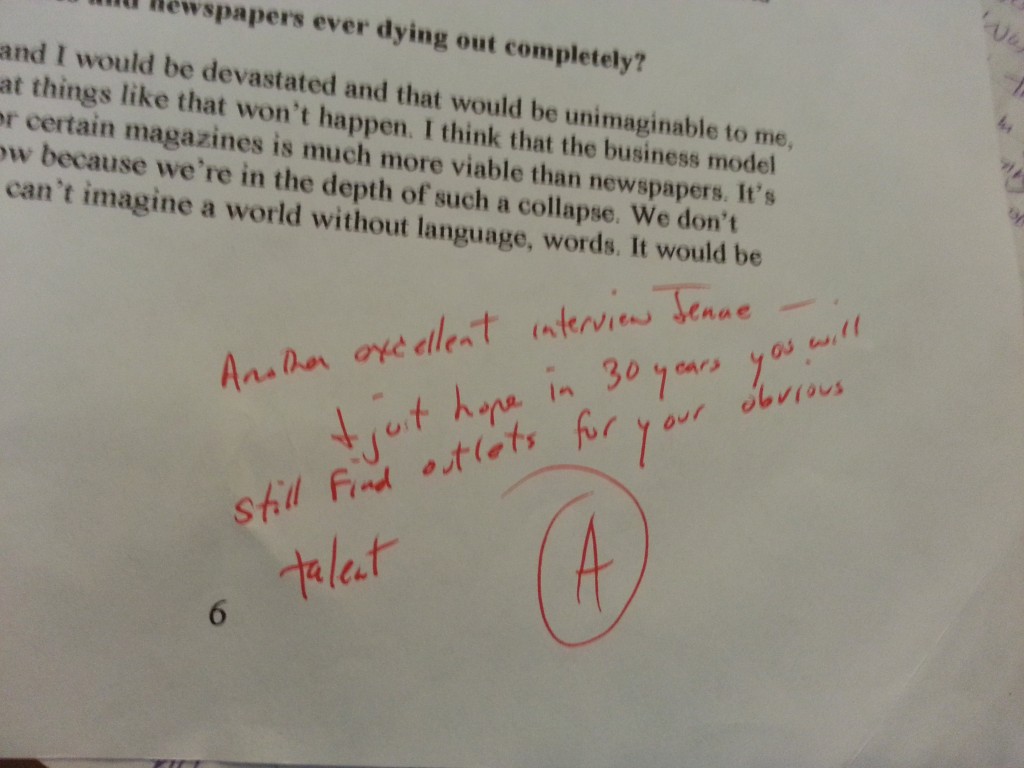Last week, I sat cross-legged on the floor of my living room sorting through piles of old papers. It’s only when I begin a move to a new apartment that I go through this purging ritual. This time around, I had to exude an enormous amount of personal strength to throw away photo-copied poems from college seminar classes (I’ll take note of the titles I like and find them online, I reassure myself), favorite New Yorker stories (again, these are all available online, I remind myself as I toss away bundles of magazine clippings with a wince), and even old stickers and leaflets I picked up from boutiques and bookstores that I once thought quaint and charming. Those too I chucked with a reluctant sigh. Nostalgia is a powerful force.
Yet every time I go through an apartment purge, I always find things that I still can’t bring myself to throw away for one reason or another. This time, it was a select collection of college papers annotated by former professors. First, allow me to defend myself and say that I threw most of my graded papers away; the majority of them did not have much on them by way of marginalia anyway and there was no sense in keeping reminders of the “A-” papers I wrote over the years.
Yet a couple of papers had comments that moved me beyond nostalgia, that made me reflect on my writing in ways that I hadn’t before and that I hope will be sobering reminders of where my writing can still grow and what I can keep doing to sustain the enthusiasm I had for writing through my college years.
First, see Exhibit A, an artifact certainly graded by a graduate student TA in a “Bible as Literature” class I took during what I believe was my junior year of college:
The comment in the image may be hard to read, so here’s what part of it says:
You raise some great points throughout this paper on John 5 and Jesus’ complex role in that text, and you do a good job of citing your source material and reading into it. Still, your paper seems disorganized at times, and in need of a much more effective overall argument to bring your various points into a more convincing unity… you make a number of different points about audience that would be even stronger if your argument was more specific and contentious.
As soon as I re-read this, I realized that this is often the kind of feedback I still receive on my writing. I may offer great ideas, but they’re frequently without a strong enough argument. I’m able to come up with a lot of different ideas and make some pointed observations, but there needs to be greater unity connecting all of these “interesting” ideas. In other words, I still struggle with coherence and argument strength and even as I’m working on an article and a dissertation this summer, I’m realizing how I often manage to fall into the same pitfalls of writing and observing a number of different and exciting things without necessarily seeing one particular argument they’re pointing to. Writing this out, the solution seems simple: articulate a clear argument and keep that argument alongside my paper as I write, ensuring that each observation ties into that argument. That, of course, is the advice I’d give to another writer.
Yet I know that this solution is much easier said than done. The biggest problem for me with articulating an argument and sticking with it is knowing that arguments frequently change during the writing process. I often find myself analyzing evidence and realizing part-way through my analysis that the conclusion I thought I had reached is only one small part of what I’m noticing and that, in fact, the argument I initially devised still needs to be more nuanced (and perhaps “contentious” as the TA in the comment suggested) than I thought before.
So, I’ve always been of the “write as much as you can and then go back and revise to create a better argument” school of thought. I still think this may be the best way to approach the particular “contentious argument” problem, but this approach takes a lot of time. I imagine in college that I didn’t review and re-write my essay nearly enough times to notice where the argument lapsed or where it seemed disorganized. I imagine too that I may have felt overwhelmed by the source material; the gospels are no joke and there’s a lot to look at there that can make the articulation of an argument even more challenging. I always tell my students that the more challenging of an idea they’re grappling with, the more likely their grammar and sentence structure is to break down. I’m really no exception to that rule; I find that the more I struggle to express a complex idea, the less clear it is going to be articulated.
So, what do I do with this knowledge that I’ve been suffering from the same writing problems for years?
At this point, my response is: remain mindful of these mistakes. I’m keeping this particular paper because it places in front of me an error I’m prone to make and helps me more mindfully look at it. Sure, I may not need to keep the paper to maintain this memory, but there’s something about holding a tangible finished product and seeing the pencil-written note assuring me that it’s not yet finished that humbles me and reminds me of how much further I still have to go with writing for all different purposes. Writing has to be slow cooked and simmered; it’s easy to forget that, especially as I compose a blog entry, the “fast food” of writing in many ways.
Of course, I keep old writing, too, not just as a form of penance, but also as a reminder of what I can accomplish and the hope that mentors have had (hopefully still have?) for me.
An example is Exhibit B:
This one’s a bit easier to read, but just in case you can’t:
Another excellent interview Jenae – I just hope in 30 years you will still find outlets for your obvious talent.
This is a bittersweet comment in its suggestion that there may not be outlets “in 30 years” for “good writing.” What it also assumes though is that I’ll still be writing in 30 years. That is the part that motivates me and fills me with some additional confidence. A professor at some point in some time had the confidence to believe in my writing for years and years to come. I saved this paper too to share this reminder with myself, that I will still be able to produce work and that I have “talent” for it. I hope that these 30 years keep getting recycled, that after 30 years, I can remember that there are 30 more years where I can keep working and writing.
Perhaps one day I’ll throw these papers away too, but in the meantime, they’re the ones I can’t quite commit to the recycling bin. They still offer me something that I couldn’t find elsewhere, artifacts of writing projects completed and motivation for projects to be completed.


